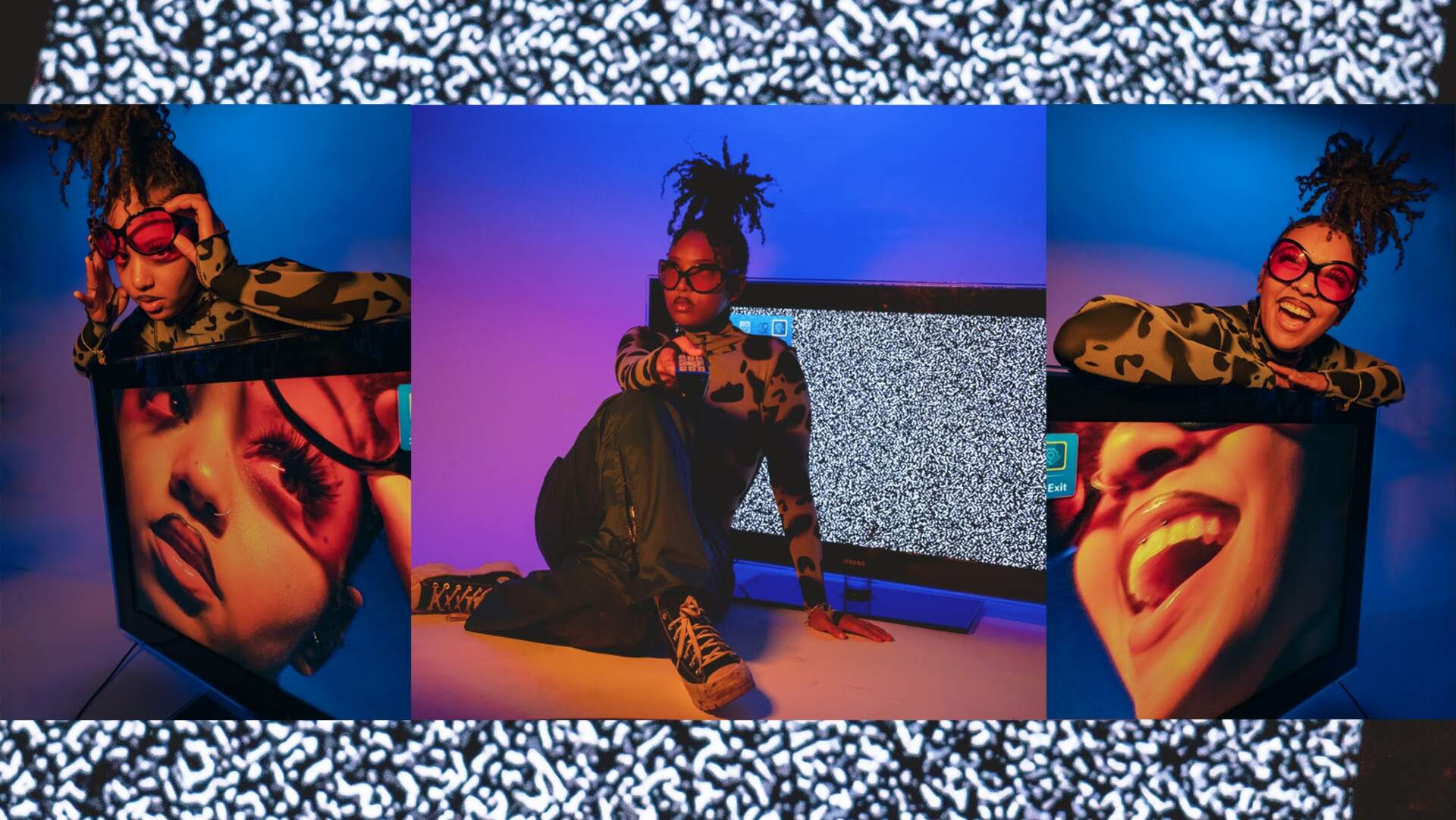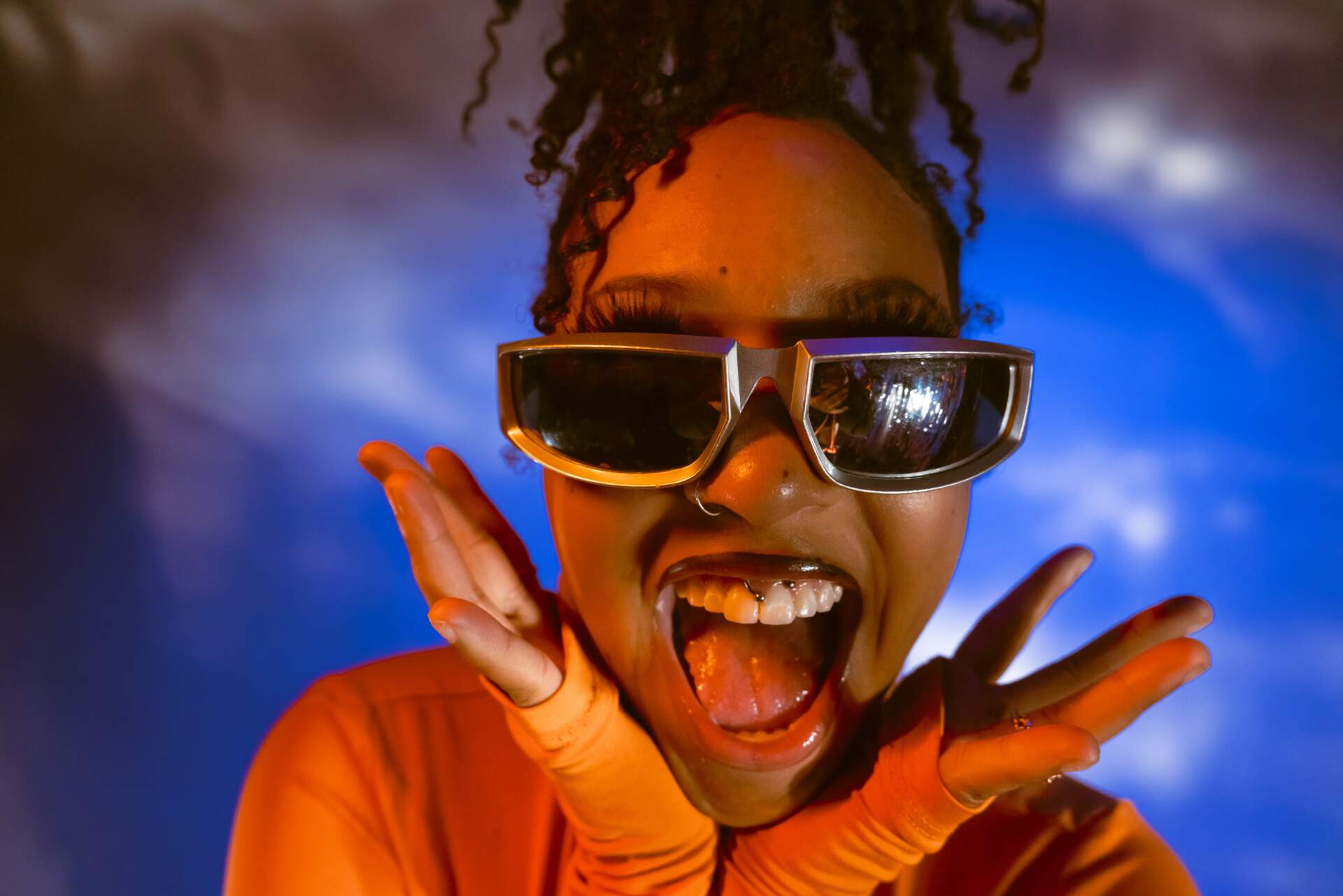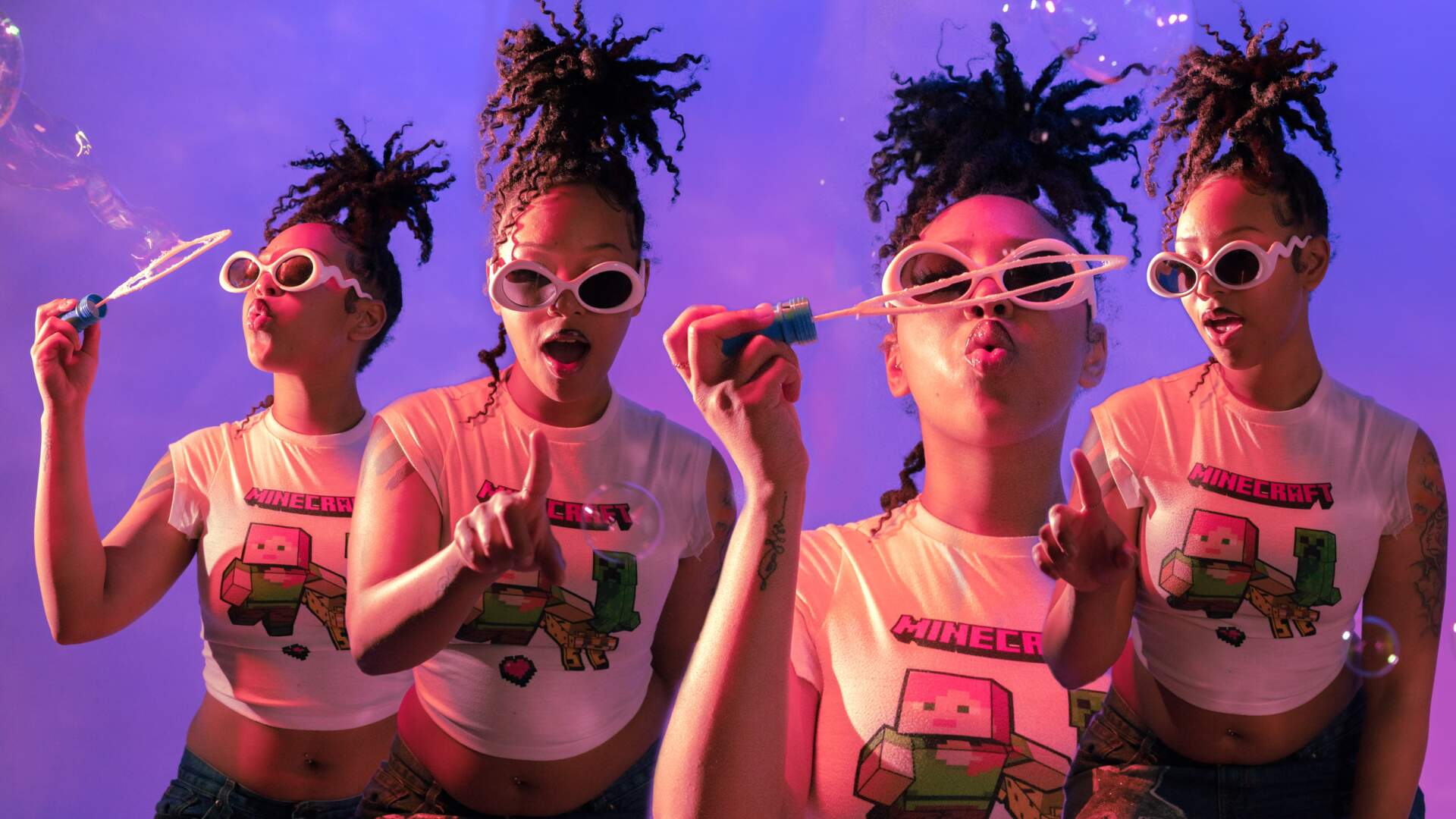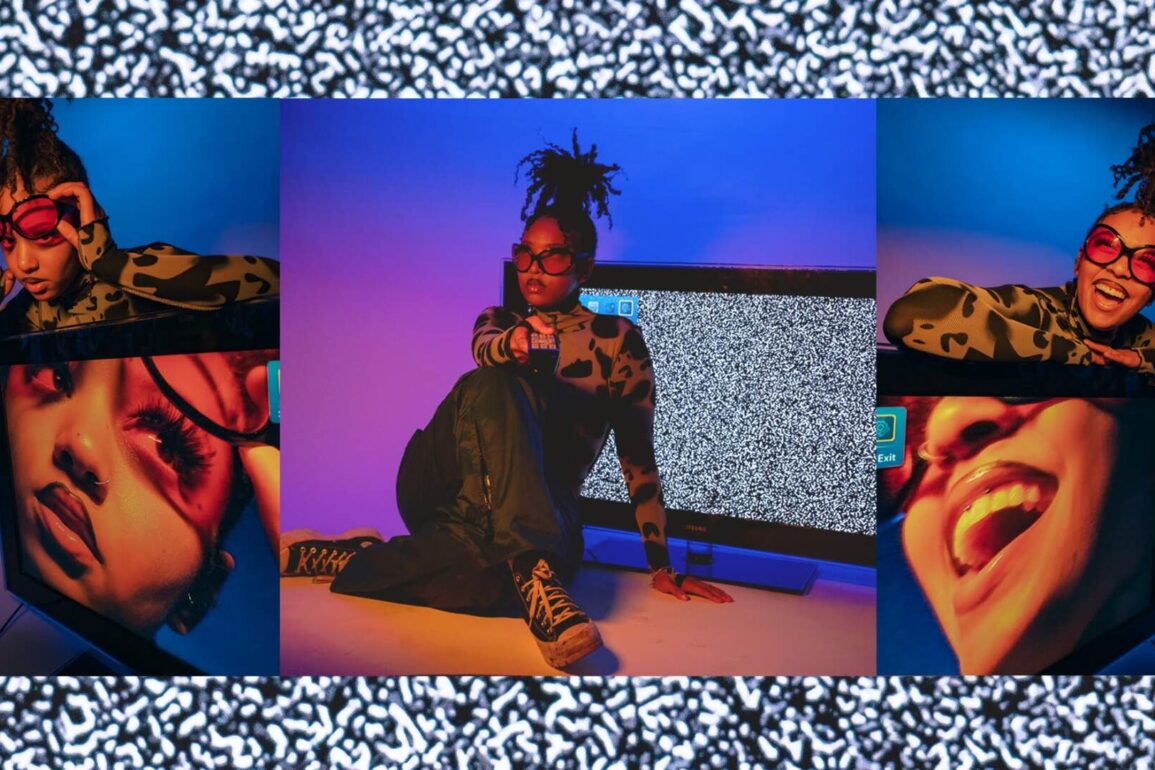When Dorchester rapper kei took the stage at the Forward Future Festival in 2021, she was pretty nervous. She’d never performed in front of a crowd before and her debut project, “baby steps,” was still new at the time. “There was a lot going on. I’m usually very timid,” she said, laughing. “There were changes in when I was supposed to go on and how the set was supposed to run.”
I was in the audience that day at Malcolm X Park in Roxbury. The crowd fell silent as kei got onstage and prepared to start her set. But within a few minutes, the energy skyrocketed. Despite it being her first time performing, kei seemed to command the crowd with her high energy and playful stage presence. That was a pivotal day for her. She said that once she was done and off the stage, she felt a sense of euphoria. “It was just a rush of emotion and I just started crying. The sun was just beaming on my face and in that moment, I felt the presence of God.”
kei didn’t grow up in a religious household and her family didn’t go to church often. She started her journey connecting with her faith right before she started making “baby steps.” “I went to church and I started going continuously,” she explained. “So, in that moment, I don’t know what it was but I just knew there was something special… That moment on stage affirmed a lot for me.” That festival was the point where she knew that music was what she was supposed to be doing.

The arts are in kei’s blood. Her mother practiced ballet in her youth and her siblings rapped and wrote poetry. kei’s father made music and had a lot of production and recording equipment in the house. She remembers making songs with him and has “pictures of us being in the studio and of him setting up the mic stand. I recorded songs with my best friends and my cousin with him.”
One of those pictures is the cover for “baby steps.” It features a toddler kei, surrounded by her father’s equipment with a pair of his headphones on. The EP is her first foray into rapping (hence the title) but you wouldn’t be able to tell by listening to it. Her delivery is tight and succinct, rolling effortlessly over the bass and percussion on songs like “pressed” and “(in) ya birkin.” There’s no shortage of confidence or bravado — kei makes it clear that she’s arrived on the rap scene and isn’t going anywhere anytime soon.
Sonically, her debut seems to be heavily influenced by 2000s rap and hip-hop (kei credits rappers like Busta Rhymes and Missy Elliott as musical influences). This changes on her second project, “terrible twos,” released in May 2022. While still very bass and drum-driven, all three tracks sample sonic elements that sound like they’re plucked out of a video game, providing an interesting contrast to the grit of the electric guitar on “made me” and the grainy vocal distortion on “s.t.o.o.p.e.d” and “wake up.”
kei’s sound and rap style are also notably more aggressive and forward but this belies some of the tender, close-to-home topics that she’s talking about in her lyrics. “wake up,” for example, features no lack of expletives, but kei is clearly referencing her childhood, rapping “I remember growing up in households that was broken/ daddy told me that whatever he said should be unspoken” and then “I don’t know what it means/ all of this s–t just ain’t what it seems/ this the lil girl that was raised in the bean.” Underneath the swearing and the high energy of the production, kei is really opening up about her life.
“I’ve watched my family struggle,” kei said. “I’ve watched my parents, you know, pay bills, check to check. And I’ve watched them sacrifice so much and not really do things for themselves. My dad had to sacrifice … his passion to make sure that me and the rest of my family was taken care of.” As kei got older, she remembers her father making music less and less. It’s part of why she’s so relentless and steadfast in her own pursuit. “I want to break the generational curse that I feel I’ve endured in my family.”




kei’s embrace of a more rage-filled sound with unique production elements drew comparisons to well-known rapper Rico Nasty, whose aesthetic and musical style set her apart from other female rappers in the music industry. Nasty loves loud hairstyles, intense makeup and quirky outfits, and her music is often carried by rage music staples like abrasive synths and 808s (the sound of the bass and drums). kei did find inspiration in Rico Nasty but it was about more than her music or look.
“As a young Black woman, there’s this stigma behind what a woman in general in music should sound like or do,” she said. “Her flow, her sound, and just how she expresses herself visually, all is inspirational to me and kind of kickstarted my perspective on how to be out of the box.” That out-of-the-box thinking starts to solidify with kei’s first full album, “CHILD’S PLAY,” which was released just a few months after “terrible twos.”
The project title references the Chucky movies from the 1980s and ‘90s (kei is a big fan of horror) but it’s also a nod to how she plays with her voice and sound. This album is darker and grittier than “terrible twos,” skewing more and more toward the rage subgenre of trap music. kei shows her range on “CHILD’S PLAY,” going from a light and lively delivery on “SWITCH LANES” to a deeper, more aggressive one on tracks like “KILLA MODE.”
For kei, rage and chaos are emotions she mines for further insight into who she is as an artist. It’s why the tone of the project is more combative. ” I drew inspiration from wanting the listener to feel like they were immersed in a horror film,” kei explained. “But not just the ‘Child’s Play’ horror films, but my horror film and just my feelings of rage.” The project further crystallized kei’s sound and aesthetic, leading to her taking home the award for Best New Artist at the 2022 Boston Music Awards.




In March, kei released her single “like ooo,” a 2000s rap-inspired track that has a completely different sound from her last two projects. It’s bouncy and energetic with none of the grit or heaviness of “CHILD’S PLAY.” It signifies a shift in direction. “I feel like, right now, my two distinct lanes are the alternative rock hip-hop and 2000s hip-hop,” she explained. “When I intertwine those things together, I think it’s just cool to just see how my sound is developing over time.” Will Frenchman mixed and mastered all the tracks and has worked on nearly all of kei’s catalogue.
She’s currently working on her next project, which she says will have a completely different sound from the rest of her discography. “It’s going to be introspective, it’s going to tell a story,” kei said. “When you’re listening this to project, I want people to feel the feelings I felt.” There’s no release date yet because she doesn’t want to feel constrained or rushed while making it. She wants the flexibility to really explore herself and her music in a deep way.
There’s no specific box that can encompass kei’s music, and there’s no genre she fits neatly into. In many ways, she pushes back at expectations of what she should be or sound like as a Black female rapper.
There is a freedom that kei embodies that’s front and center in all of her work. And that will continue as she grows as an artist.
This post was originally published on this site be sure to check out more of their content.





